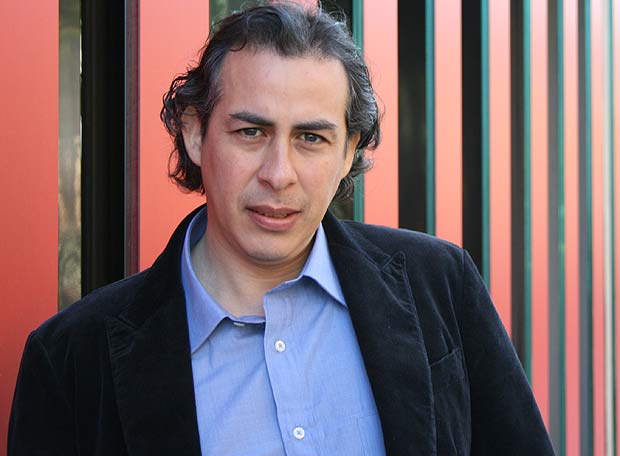
Eder. Óleo de Irene Gracia
Iván Thays
David Foster Wallace. Ilustración: philip burke. Fuente: The New Yorker Conmovedor, conmovedor, conmovedor. No sé qué más decir después de leer las 13 páginas que D.T. Max le dedica a David Foster Wallace en The New Yorker. Es un paseo por su vida y su obra, desde el nacimiento, las obras, el éxito, la depresión, las pastillas que tomaba y que dejó de tomar a último momento, el brevísimo periodo de optimismo que le siguió a esa decisión (según lo comenta Jonathan Frazen) y luego la oscuridad total, la lucha contra el instinto suicida y aquella última imagen, que atestiguó su esposa, del extraordinario narrador de 46 años ahorcado delante de 200 páginas perfectamente visibles de su inacabada novela. Esta descripción de los últimos días de la vida del escritor es contundente:During the spring of 2008, a new combination of antidepressants seemed to stabilize him. When GQ asked him to write an essay on Obama and rhetoric, he felt almost well enough to do it. The magazine reserved a hotel room for him in Denver. But he cancelled. That June, the annual booksellers? convention was in Los Angeles, and Wallace drove there to have dinner with Pietsch, Nadell, and a few others. Pietsch was amazed at how thin Wallace was. Nadell, at Wallace?s request, explained to magazine editors that he had a stomach malady. ?It had to be severe enough to explain why he couldn?t travel,? she remembers. About ten days after the dinner, Wallace checked in to a motel about ten miles from his home and took an overdose of pills. When he woke up, he called Green, who had been searching for him all night. When she met him at the hospital, he told her that he was glad to be alive. He was sorry that he?d made her look for him. He switched doctors and agreed to try electroconvulsive therapy again. He was terrified at the prospect?in Urbana, it had temporarily taken away his short-term memory?but he underwent twelve sessions. They did not help. Caring for Wallace was exhausting. For one nine-day period, Green never left their house. In August, her son suffered an athletic injury, and she wanted to be with him. Wallace?s parents came to look after David. ?It?s like they?re throwing darts at a dartboard,? he complained to them about his doctors. They went with him to an appointment with his psychiatrist; when the doctor suggested a new drug combination, Wallace rolled his eyes. Eventually, Wallace asked to go back on Nardil. But Nardil can take weeks to stabilize a patient, and Green says that he was too agitated to give it time to work. Still, in early September, Nadell spoke with him and thought that he sounded a bit better. Green believes that she knows when Wallace decided to try again to kill himself. She says of September 6th, ?That Saturday was a really good day. Monday and Tuesday were not so good. He started lying to me that Wednesday.? He waited two days for an opportunity. In the early evening on Friday, September 12th, Green went to prepare for an opening at her gallery, Beautiful Crap, in the center of Claremont, about ten minutes from their home. She felt comforted by the fact that he?d seen the chiropractor on Monday. ?You don?t go to the chiropractor if you?re going to commit suicide,? she says. After she left, Wallace went into the garage and turned on the lights. He wrote her a two-page note. Then he crossed through the house to the patio, where he climbed onto a chair and hanged himself. When one character dies in ?Infinite Jest,? he is ?catapulted home over . . . glass palisades at desperate speeds, soaring north, sounding a bell-clear and nearly maternal alarmed call-to-arms in all the world?s well-known tongues.? Green returned home at nine-thirty, and found her husband. In the garage, bathed in light from his many lamps, sat a pile of nearly two hundred pages. He had made some changes in the months since he considered sending them to Little, Brown. The story of ?David Wallace? was now first. In his final hours, he had tidied up the manuscript so that his wife could find it. Below it, around it, inside his two computers, on old floppy disks in his drawers were hundreds of other pages?drafts, character sketches, notes to himself, fragments that had evaded his attempt to integrate them into the novel. This was his effort to show the world what it was to be ?a fucking human being.? He had not completed it to his satisfaction. This was not an ending anyone would have wanted for him, but it was the ending he chose.The New Yorker también publica un fragmento, bajo el título «Wiggle room», de la obra póstuma y no terminada de Wallace que será publicada sin duda antes del próximo año.

